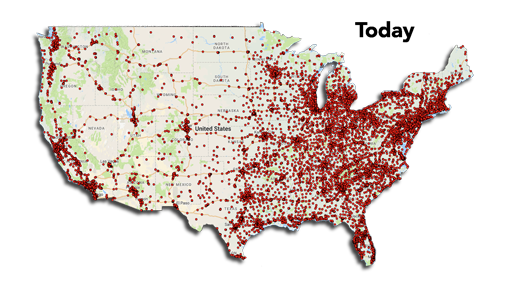10 Dividend Stocks Raising Red Flags Dear Reader, If I could give you one piece of advice about building wealth in this market, it would be to have a long-term plan. If you focus only on what’s happening right now, you’ll miss the bigger opportunities just around the corner. So, let’s direct our focus to the kings of future gains: dividend stocks. Dividend stocks pack a one-two punch of security and profit opportunity. As a holder of dividend stocks, you receive a steady stream of income from your investment. The cash payments these companies provide give investors the confidence they need to keep buying pressure behind the stock and keep volatility low. In other words, dividends are a great way to increase your wealth. That’s why I want to use today’s Market 360 to dive into what a dividend is and how they work. I’ll also explain why not all dividends are created equal and provide a list of 10 dividend stocks that are waving red flags right now. Then, I’ll share what you should look for in a dividend and where you can find fundamentally superior dividend stocks to add to your portfolio. What Is a Dividend? So, what is a dividend?
A dividend is a cash distribution from a company’s earnings paid directly to a class of its shareholders. It is up to the company as to when (or even if) it is paid.
The dividends are typically paid out on a quarterly basis, but some companies will pay a semi-annual or annual dividend. Company management will always announce when it will be paid – including your deadline (an ex-dividend date) to buy the stock in order to receive this payout – and what the dividend will be per share. Why Do Some Companies Issue Dividends? Dividends are one of the oldest and most basic ways for a company to communicate that it is healthy. A company’s willingness to pay consistent dividends over many years is a pretty good indicator that it is on solid ground and that it is backed by strong fundamentals.
It’s in a company’s best interest to maintain and increase its dividend. Much of the funds that are distributed as dividend payments are used to reinvest back into shares, and that provides support for the stock.
Plus, companies remain awash in cash. They are using much of that money to buy back debt and stock as well as for acquisitions, but the money is also going into their dividend. Not All Dividends Are Created Equal I should add that the dividend yield varies depending on the company’s actual dividend and where the stock price is at the time. In some cases, you may be looking at a double-digit dividend yield. But as attractive as a double-digit dividend yield may sound, I recommend you pump the brakes before investing. Chasing dividend yields alone can be downright dangerous. Stocks are not like Treasury bonds or a savings account: There’s no guarantee that you will get your money back. There’s also no guarantee that a company will continue paying a dividend. If you choose poorly, you could lose your capital as the stock price falls. Or, that nice juicy dividend could be slashed.
In most cases, dividend yields are tantalizingly high for a reason (the stocks are cheap and rightly so) – and are simply not supported by the fundamental earnings power of the business. This is why my Dividend Grader is so important. Just like my Portfolio Grader, it uses my proprietary formula to put each stock through a rigorous test, crunching reams of data against a set of criteria I’ve created. Specifically, Dividend Grader measures a dividend stock’s Dividend Trend, Dividend Reliability, Forward Dividend Growth and Earnings Yield. All this comes together to deliver you a Total Grade. Just like Portfolio Grader, an A- or B-rating is considered a “Buy,” a C-rating a “Hold,” and a D- or F-rating a “Sell.”
Here are 10 examples of dividend stocks with high dividend yields but also hold an F-rating or a D-rating in Dividend Grader, indicating that you should stay far, far away: | ACRE | Ares Commerical Real Estate Corporation | 14 | F | | AJX | Great Ajax Corp. | 6.8 | F | | BGFV | Big Five Sporting Goods Corporation | 6.6 | F | | CHMI | Cherry Hill Mortgage Investment Corp. | 16 | F | | DSX | Diana Shipping Inc. | 16 | D | | FSK | FS KKR Capital Corp. | 14.4 | D | | GNL | Global Net Lease, Inc. | 15.4 | F | | HIHO | Highway Holdings Limited | 9.7 | F | | KREF | KKR Real Estate Finance Trust, Inc. | 10.7 | F | | ORC | Orchid Island Capital, Inc. | 17 | F | How to Find a Quality Dividend Stock Please keep in mind that dividend yields are a two-way street: A high dividend yield could either be because of a healthy dividend payment or due to a drop in stock price. The point is not to buy simply because the yield appears good. Moving beyond the yield and current dividend payment, you want to look at the company as a whole and its history of dividend payments. Consistent and steadily increasing payments are a prime sign of a strong company that makes dividends work for you. Of course, not all dividend stocks are created equal, despite the natural padding they provide. Here are my criteria for selecting the best dividend growth stocks: - A generous dividend yield – after all, this is a profit maximizing exercise!
- A dividend yield that isn’t substantially higher than competitors’ yield – remember, that’s a red flag for fundamental problems.
- At least a B-rating in Portfolio Grader – there’s no point in looking into it if it’s a C-rated stock, which would make it an automatic hold.
- A significant increase in dividend payments over the years.
Where to Find the Best Dividend Growth Stocks In Growth Investor, I have an entire portfolio of Elite Dividend Payers, and for a stock to be added to this list, it must have an “AA” rating. This means that it holds an A-rating in Dividend Grader and Portfolio Grader. An AA-rated stock is the best of the best in terms of fundamentals, buying pressure and dividend payments. It also provides consistent dividend income and it’s poised to outperform the market at every turn. I recently added an AA-rated stock to my Elite Dividend Payers Buy List last month. It’s an energy company that’s paid a dividend for 45-straight quarters. Most recently, the company paid a first-quarter dividend of $0.875 per share, or a 52% increase over the fourth-quarter dividend. It also has a fat 9% dividend yield. Click here for full details. (Already a Growth Investor subscriber? Click here to log in to the members-only website.) Sincerely, | .png)
.png)





No comments:
Post a Comment